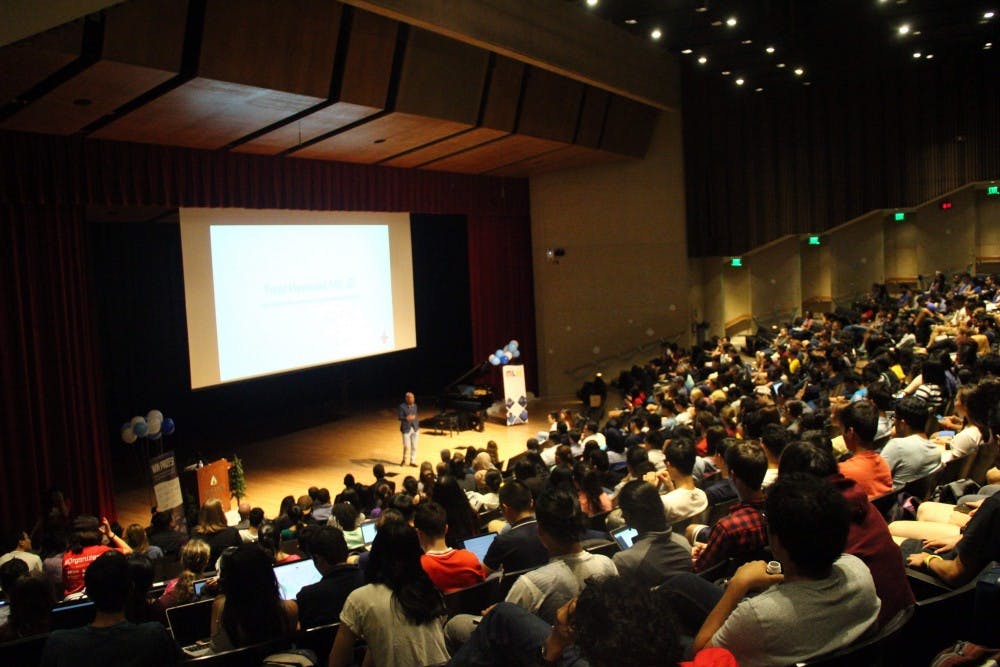This past weekend, students and healthcare professionals from across the country gathered at the annual MedHacks competition hosted by Hopkins students.
MedHacks, an entirely student-run medical hackathon, kicked off its fourth annual event called “Snow Day” from Sept. 7 to 9 at the School of Medicine. This year the event attracted a total of 3,000 applicants who represented over 250 schools and 100 different majors.
The hackathon, following traditions from previous years, started with an opening ceremony followed by a pitching session, where each team had the chance to pitch their project idea to everyone else.
Two keynote speakers were invited to speak at the event this year: Roy Ziegelstein, the vice dean for education at the Hopkins School of Medicine and the vice chair of humanism in the Department of Medicine at the Bayview Medical Center, and Trent Haywood, the chief medical officer for the Blue Cross Blue Shield Association (BCBSA).
Healthcare in the 21st century is a rapidly evolving field filled with constant surges of innovations and technological breakthroughs. MedHacks was founded four years ago with the purpose of bringing together people from different backgrounds who share a common passion in striving to integrate healthcare and technology.
In the past few years, thousands of people from over 500 institutions across the world set foot in Hopkins for the medical hackathon. Many were excited to broaden their horizons by networking with undergraduates, graduate students, PhD candidates and various professionals in the field.
Participants of MedHacks 2018: “Snow Day” were given a total of 36 hours to work in groups and come up with a finished product that may manifest in the forms of computer codes, ideas, theories or a combination of the three. Each project should serve to address a pressing contemporary issue in the medical field.
Hackers had the freedom to choose the topic of their project from three distinct medical tracks: patient safety and quality (sponsored by the School of Nursing and the Armstrong Institute), community health infrastructure (sponsored by BCBSA) and open science to advance equity (sponsored by the Alliance for a Healthier World).
In the end, the groups presented their results and two rounds of judging ensued until the judges proclaimed a winning team for each track. Additionally, there was an overall winner that was determined by community voting.
This year, the patient safety and quality track winners created a pressure sensing device that helps prevent falls due to orthostatic hypertension in the elderly population.
The community health infrastructure track winners generated an app called ZipFood, which gives people with chronic diseases more information about which diet (and accompanying recipes) they should follow.
Finally, the open science to advance equity track winner was an app called Sisu, which translates foreign words without a clear definition in English to help doctors treat patients who do not speak English as a first language.
The community-voted winning team, Melanotix, built an Android app and a web app that took photos of blemishes and told the user within a certain degree of certainty how probable it was that the spot was melanoma or a sign of melanoma.
Emily Burnette, a junior Biomedical Engineering major and the co-director of MedHacks, described her experience organizing the hackathon in an interview with The News-Letter.
“My biggest challenge as director over the past year was making this experience a good one for everyone on the organizing team. It’s always important for leadership of any club to remember that you need to put the humanity and needs of the fantastic people of your team ahead of any lofty goals that you may have for the event,” Burnette said.
“You need to be realistic about what you’re going to accomplish. There were a lot of things that I wanted to do but wasn’t able to, and it was challenging to continue to remember that the event was incredible nevertheless.”
Many Hopkins students revealed that they had a positive experience competing in this year’s hackathon.
In an interview with The News-Letter, sophomore Matthew Lee, a Materials Science and Engineering major and second-year MedHacks participant, described the project that he and his team devised. The goal of their project was to build a modular wheelchair in the hopes of helping patients transfer from a wheelchair to a bed with more ease.
“Traditionally, this would involve a body sling that would be expensive, uncomfortable to the patient and taxing on healthcare providers. Our project was meant to elevate some of this inconvenience,” Lee said. “My overall experience has always been great at MedHacks, with planned-out schedules and plenty of food, drinks, caffeine and snacks for the 36 hours.”
Burnette believes that MedHacks is special partially because of the way it stresses the experience that the hackers have during the event and because the event is accessible even to those who had never attended a hackathon before.
“In the future, I hope to create more support for those individuals while still growing the event to reach new peaks of innovation. I want to continue to increase the quality of the projects that come out of MedHacks without sacrificing the learning and growing aspects for hackers, especially those who had never gone to an event like this before,” Burnette said.





